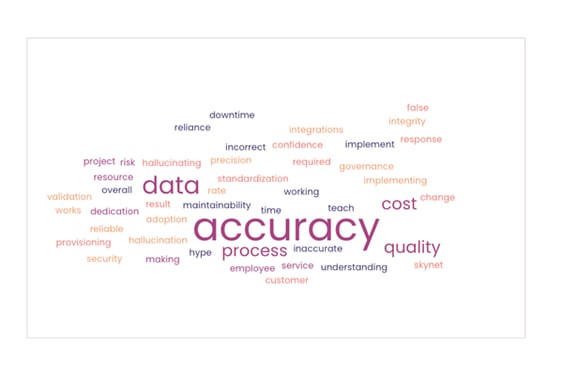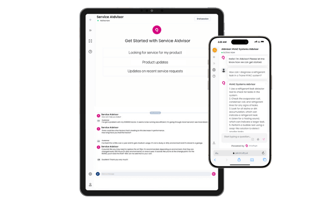The Field Service East 2024 conference brought together industry leaders, innovators, and field service professionals to discuss the future of service delivery. While the event covered a lot of ground, the buzz around AI was hard to miss. Attendees were curious about how AI could fit into their field service operations—how it works, what it can do, and how it might make their jobs a little easier.
Let’s explore some of the key takeaways from the event, the emerging needs of field service teams, and the concerns that are still top of mind regarding AI.
Takeaways
Amid the discussions and presentations, a few key themes caught our attention. These insights reflect where the industry is headed and how organizations are gearing up to tackle the challenges of modern field service.
AI domination
AI continues to dominate discussions in the field service industry, and for good reason. As experienced technicians retire, the industry faces a growing expertise gap, leaving new hires with limited knowledge to manage increasingly complex products.
Eric Porter, VP of Centralized Services at Ricoh, in his presentation, "Leveraging AI, Automation, and Remote Connectivity," emphasized how personalized AI, which adapts to the specific needs of each machine and user, is proving to be a game-changer. It enhances workforce proficiency, reduces service costs, and accelerates time to competency.
While AI generated a lot of excitement, a survey done during the conference raised one common concern among attendees. Accuracy. In an industry where precision is critical, there’s hesitation around relying too heavily on AI without knowing how accurate its responses will be, especially in high-stakes situations. This highlights the importance of developing trustworthy AI systems that continuously evolve with new data and feedback.

As AI advances, it offers businesses a pathway to effectively address the knowledge gap while elevating the overall service experience.
New business models for success
Field service is shifting from a cost center to a profit center, with new business models driving revenue and growth.
A key point was the shift toward subscription models and dynamic pricing strategies, which create more flexible revenue streams and align services with customer needs. Tailored service agreements, in particular, are gaining traction as a way to meet and exceed customer expectations while also boosting satisfaction and loyalty.
Zachary Siceloff, Director of Operations at Power Systems, Carolina Cat, touched on this in his presentation, "A-La Carte Service Contracts," where he explored how customizing service agreements can transform them into significant drivers of customer satisfaction and long-term loyalty.
Another major theme was data enablement in transforming field service operations. By leveraging data, businesses can enhance customer experiences, optimize service delivery, and create new revenue streams. This data-driven approach improves efficiency and helps companies anticipate customer needs.
Workforce optimization
As field service organizations face increasing pressure to deliver high-quality service with a shrinking workforce, optimizing the performance and engagement of Field Service Engineers (FSEs) is essential.
.jpeg?width=429&height=322&name=Image%20(2).jpeg)
A key point was the importance of equipping FSEs with the right tools and resources. Access to self-service knowledge bases, real-time data, and ongoing training are crucial for enabling FSEs to perform their jobs efficiently and effectively. Organizations must ensure that their workforce is well-prepared to handle the complexities of modern service operations.
Patrick Dell, Field Vice President of Service Operations at Varian Medical Systems, in his presentation, "Mobilizing Field Service Excellence," reinforced these points, emphasizing the need to create environments where FSEs can thrive. His insights highlighted the importance of investing in workforce development to close the service expertise gap and improve overall service delivery.
Customer experience at the core
At the heart of any successful field service operation is a customer-first mindset.
Craig M. Bruns, Vice President of Customer Support at Crown Equipment Corp., in his presentation, "Leveraging New Technology in Field Service," highlighted the importance of making it easy for customers to connect through apps or integrated systems and designing products with serviceability in mind. By prioritizing customer experience, companies can boost satisfaction and streamline service processes, ensuring that customers get the support they need promptly.
Establishing and defining Service Level Agreements (SLAs) is another critical component of delivering an exceptional customer experience. Well-structured SLAs ensure that resources are allocated effectively and that service teams are staffed appropriately to meet customer expectations. This focus on clear, measurable SLAs is vital for maintaining high levels of customer satisfaction throughout the service journey.
Field service needs: what are the key priorities?
Beyond the broader trends, common priorities for field service organizations emerged as they looked to improve their operations and service delivery.
Speed to resolve customer issues. Quick issue resolution is a top priority. With customer expectations higher than ever, there's a pressing demand for tools and technologies that can accelerate the troubleshooting process and reduce downtime.
Bridging the knowledge gap. As seasoned technicians retire, they take years of experience and knowledge—assets that aren't easily replaced. Simultaneously, new technicians entering the field often lack the skills and experience to manage increasingly complex tasks.
Tailored answers and complex troubleshooting. Field service teams need specific, tailored answers for complex issues. The demand for AI that can provide detailed, context-specific answers was a recurring theme at the event.
Empowering field service with AI: the future is now
Field Service East 2024 highlighted the exciting possibilities AI brings to the field service industry. As field service organizations look to adopt new technologies, the need for faster issue resolution, bridging the knowledge gap, and getting tailored, actionable insights is clear.
This is where Service AIdvisor comes in.
Imagine this: One of your technicians is faced with a challenging problem on-site. Instead of digging through manuals or waiting for an expert to weigh in, your technician can rely on Service AIdvisor. It provides immediate, AI-powered guidance drawn from your company’s own data.
Each recommendation is traceable, so your team knows exactly where the information comes from, building trust in the process.
Now think about the impact of this: Newer technicians, who might not have the depth of experience of their senior counterparts, can confidently tackle issues with the support of Service AIdvisor. They get specific guidance that’s directly relevant to the situation at hand—no generic responses, just the precise information they need to get the job done right.
When it comes to speed: Service AIdvisor doesn’t just help your team work faster; it helps them work smarter. By providing tailored diagnostics and insights, it cuts down on downtime and ensures that your customers’ issues are resolved quickly and efficiently.
Missed us at Field Service East? You can still experience how Circuitry.ai can transform your field service. Request a personalized demo today and sign up for a proof of value to get started.
.png?width=562&height=281&name=service-aidvisor-trial-cta%20(1).png)